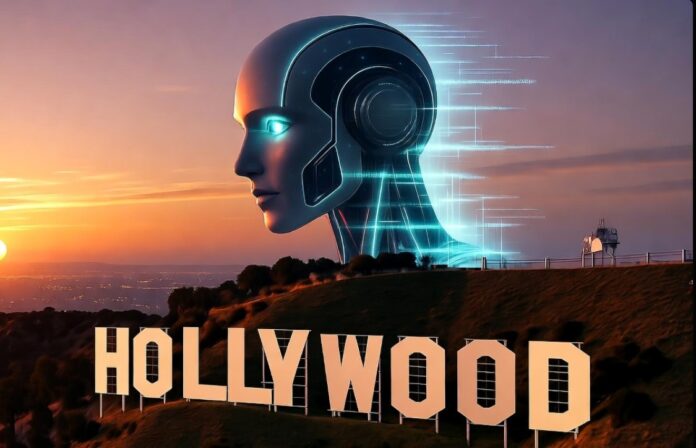Hollywood has finally met a fraud more convincing than itself: an AI actress named Tilly Norwood. She doesn’t eat, doesn’t age, doesn’t negotiate, doesn’t throw tantrums, and doesn’t need a Winnebago stocked with Fiji water and scented candles parked outside the set. She just exists — digitally, effortlessly, perfectly — and she is the reason for the shrieks of terror you now hear echoing across the canyons of Los Angeles. The Botox aristocracy, whose faces are pulled tighter than a snare drum, is suddenly lecturing us about the sanctity of “authentic performance.” Authentic? From the same people who live in a perpetual state of airbrushed unreality, who require stylists, surgeons, personal trainers, digital editors, and lighting crews just to appear human for ninety minutes as they read a script? Please.
The truth is Hollywood has never trafficked in authenticity. What it sells, what it has always sold, is illusion. Whole teams of makeup artists and stylists swarm a star before the cameras roll, and even then, the same line will be delivered in thirty takes until a director can paste together one flawless moment. Post-production polishes off the rest. By the time the credits roll, what you’ve seen on screen is no more “real” than a wax figure at Madame Tussauds. And yet now, after decades of building an empire on smoke and mirrors, Hollywood wants to clutch its pearls at the prospect of a digital competitor? Forgive me if I don’t cry.
Nor will Middle America. This isn’t a union of truck drivers or factory workers fighting for a fair wage. This is an industry of self-aggrandizing zillionaires, many of whom aren’t even particularly talented, who spend their lives sneering at the very people they expect to pay their salaries. They bask in obscene excess, reward each other with golden statues for the most superficial qualities, and excuse every sort of bad behavior in the name of “art,” all the while condemning the rest of us. Now they want pity? Too bad. So sad.
Make no mistake: audiences will embrace AI just as they embraced cartoons, the Muppets, and CGI. The illusion is the point. And soon, we’ll just create our own illusions.
And here’s the part that terrifies them most: regulation won’t save them. You can’t regulate culture, and you can’t regulate decentralization. The monopoly is gone. Anyone with a phone and a decent idea can reach an audience now, without the permission of a Hollywood studio. The collapse of the old studio system in the 1950s was seismic enough, but it was nothing compared to what’s coming.
I’ve written about this before, in my essay A.I. Makes Netflix’s New Studios in New Jersey Obsolete, where I predicted:
“Within a decade — likely less — anyone with a mid-range computer could create a cinematic masterpiece by typing a few prompts into an AI program. Imagine it: ‘Create a two-hour action thriller set in Eastern Europe, à la James Bond, with the protagonist looking and sounding exactly like me.’ Out will come a film, flawlessly rendered, indistinguishable from reality, and tailored to every whim of the ‘creator.’ No actors. No directors. No union disputes or multimillion-dollar overheads. Just algorithms doing what they do best: responding to demand with ruthless efficiency. If this sounds like science fiction, it is only because some still cling to the comforting notion that creative processes require human hands. But that romantic idea is eroding as surely as the credibility of those who insist on clinging to it.”
For years, Hollywood has grossly overpaid celebrities to lend their voices to animated films, as though anyone in the theater actually cared who was squawking out the lines. Was that authentic? The magic was always in the character, not the pampered actor reading the script between spa appointments. That model was asking to be killed off — and now it will be.
Comedy will fall just as quickly. And don’t think this isn’t already happening. If you think the Saturday Night Live hacks or the writers for late-night television — or the guys tooling around small comedy clubs — aren’t already feeding prompts into AI to generate their content, I’ve got a ticket to Cats to sell you.
And yet, does the audience care as long as it laughs?
So yes, Hollywood is in hysterics over a synthetic actress. But perhaps it’s only fitting. The most artificial industry on earth, the one that’s survived for a century on plastic surgery, PR spin, and manufactured illusion, has finally found itself out-faked. And unlike the endless sequels and remakes it keeps forcing on us, this story actually has a fitting ending: the phoniest people in the world being devoured by something even phonier. This is no Greek tragedy. It’s Shakespearian justice.
You may also be interested in:
- The Oscars: Where #MeToo Hypocrisy Wins Best Picture – Conservative Opinion
- Hollywood’s Diversity Push Misses the Bigger Picture: A Need for Virtuous Cinema – Conservative Opinion
- Righteous Indulgence: White Lotus and the Gospel of the Rich Liberal – Conservative Opinion
- A Conservative’s Overture to the Arts Community – Conservative Opinion
- Saturday Night Left: How SNL Ignores the Absurdities of the Left to its own Detriment – Conservative Opinion












